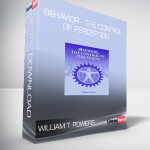William T. Powers – Behavior – The Control Of Perception
Original price was: $49.00.$17.00Current price is: $17.00.
His interest in control theory as a model of behavior began while he was a medical physicist at the Veteran s Administration Research Hospital in Chicago, where he designed many devices for medical research; notably, a curve-tracer for plotting isodose contours in the beam of radiation from a Cobalt-60 therapy machine.
- Description
- Reviews (0)
Description
William T. Powers – Behavior – The Control Of Perception
– 2005 Peter J. Burke, Chairman, Professor, Department of Sociology, University of California, co-editor, Advances in Identity Theory and Research.
Get William T. Powers – Behavior – The Control Of Perception download
“It is wonderful to see, after more than thirty years, the reprinting of Powers classic volume, Behavior: The Control of Perception, which was instrumental in introducing, defining, and outlining a control theory for understanding purposive behavior. From its inception, it has set forth a consistent, coherent and somewhat revolutionary view of the nature of the relationship between perception and behavior that people (indeed, all living things) use behavior to purposefully control their perceptions or sensing of important conditions in the environment. Two things make this reprinting significant. …First, though it was written over thirty years ago, it remains very contemporary and current in its view, perhaps because it was initially so prescient in understanding purposive behavior. Second, though it is not an overly long book, it covers virtually all aspects of the control process from simple control systems to multi-leveled hierarchical control systems, from learning and reorganization to memory, and it attends to the biological bases of the processes as well as the more social aspects like conflict and interpersonal control.”
–Professor Burke, back cover copy 2005<br /><br />1973 – Russell L. Ackoff
Silverberg Professor of Systems Sciences, University of Pennsylvania; Past President of the Operations Research Society of America; author of The Design of Social Research, co-author of On Purposeful Systems, fundamentals of Operation Research and other books. Publication of William Powers book, Behavior: The Control of Perception, is, in my opinion, a major event in the development of the psychology of perception. The completely new approach he has developed using cybernetic concepts cannot help but be seminal, instigating a new and important line of investigation of a wide range of psychological phenomena in addition to perception. His new way of looking at and conceptualizing old things will help to open the way for a series of important discoveries, and these because of the rigorous framework he provides are likely to be sounder scientifically than most of the earlier work that they will displace.
Thomas S. Kuhn, Professor of the History of Science, Princeton University; author of The Structure of Scientific Revolution.
“Powers manuscript, Behavior: The Control of Perception, is among the most exciting I have read in some time. The problems are of vast importance, and not only to psychologists; the achieved synthesis is thoroughly original and the presentation is often convincing and almost invariably suggestive. I shall be watching with interest what happens in the directions in which Powers points.”
–Aldine deGruyter, 1st Edition 1973
“[Behavior: The Control of Perception] points the way to a new psychology that is not only good science but also good practice inasmuch as it shows us how to deal more successfully with ourselves and the control systems we live with.”
Richard S. Marken, Ph.D.
Senior Behavioral Scientist, educator and
author ofMind Readings: Experimental Studies of Purpose Mind Readings II: Methods and Models in the Study of Purpose –Richard S. Marken
“Powers’ manuscript…is among the most exciting I have read in some time. The problems are of vast importance, and not only to psychologists; the achieved synthesis is thoroughly original and the presentation is often convincing and almost invariably suggestive. I shall be watching with interest what happens in the directions in which Powers points.” -Thomas Kuhn
Legendary philosopher/educator
Author, The Structure of Scientific Revolutions –Thomas Kuhn
About the Author
Bill Powers grew up in a suburb of Chicago, Illinois and served in the United States Navy in World War II, after which he earned his Physics degree from Northwestern University on the GI Bill.
His interest in control theory as a model of behavior began while he was a medical physicist at the Veteran s Administration Research Hospital in Chicago, where he designed many devices for medical research; notably, a curve-tracer for plotting isodose contours in the beam of radiation from a Cobalt-60 therapy machine.
While attending the Graduate School of Psychology at Northwestern in 1960, he worked part-time as a technician in the Department of Astronomy where later he became chief systems engineer. In that capacity, Powers designed and built low-light-level television systems for astronomy. He was involved in the design of the Lindheimer Astronomical Research Center, and was responsible for the design and building of the Corralitos Observatory. He created the automatic all-sky photometer for use on the moon (for Apollo 18, which never flew).
During this period, Powers conducted several one-quarter seminars on control theory at NU, sponsored by Don Campbell and Hugh Petrie. Throughout these early years, he was publishing regularly on the subject of control theory. (This book was the culmination of 20 years study when it was first published in 1973.)
In 1984, Powers and his colleagues founded the Control Systems Group (CSG); members participate in research, discussion, and practical application of control theory, now called Perceptual Control Theory (PCT).
Powers retired in 1990 from the Chicago Sun Times, where he spent over a decade as a technician in the technical services group. Among many special projects, he developed a system for receiving newsprint manifests by wire, and won the Marshall Field Award for his microcomputer system for receiving, formatting, and typesetting satellite-broadcast stock tables in real time.
Throughout his varied career, and ever since, he has continued his work on developing a control-system model of behavioral organization. In retirement, Powers spends his time writing, giving seminars and papers at scientific meetings, conducting research and working with colleagues on collaborative projects, such as building testable models of the theory.
Recently asked to describe himself, Bill said: I ve always been pretty much a blue-collar type, by training and by preference.”
Publisher’s Note: Bill Powers is currently working on an exciting new book, third in the Living Control Systems Series. Subject: Modeling and Simulations with interactive programs on CD for testing and developing applications of Perceptual Control Theory (PCT). Forthcoming from Benchmark Publications Inc.
Get William T. Powers – Behavior – The Control Of Perception download





Reviews
There are no reviews yet.